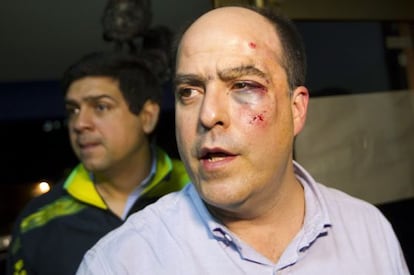Maduro tells Spain to “stop sticking its nose” into Venezuela’s affairs
Shocking scenes of fighting in parliament deepen the crisis in the country

Speaking on national radio and television, Venezuelan President Nicolás Maduro on Wednesday angrily rejected an offer of international mediation made earlier in the week by Spanish Foreign Minister José Manuel García-Margallo, telling him to “keep his nose out of our business.”
Maduro, the former chancellor who was elected as successor to Hugo Chávez in a controversial election last month, used harsh words to rule out any possibility of Spanish mediation, aimed at reducing the tensions between the government of Maduro and the Venezuelan opposition, led by Henrique Capriles, which is refusing to accept the results of the disputed April 14 vote.
“We would be absolutely delighted to do something, whatever is asked of us, to guarantee peace, prosperity and stability in Venezuela,” said García-Margallo in Washington on Monday, during a meeting with the Organization of American States (OAS).
In response to those comments, Maduro told his audience on Wednesday: “Get out of here, Spanish ambassador, you impertinent person. [...] Sir, don’t come to mediate in Venezuela, get out on to the streets and respond to the Spanish working class, who have been robbed of their right to work, of their salaries, and of their pensions by your government.”
Get out of here, Spanish ambassador, you impertinent man,” said Maduro
This new spat is the second of its kind between Caracas and Madrid in less than two weeks. In mid-April, Maduro called the Spanish ambassador to Venezuela to account after his government interpreted comments by García-Margallo as a refusal on the part of Spain to recognize his election victory. Subsequent threats made by the Venezuelan government were withdrawn after a statement was released by the Spanish minister recognizing Maduro’s win.
During the same public appearance, Maduro also spoke about the violence that had broken out in Venezuela’s National Assembly on Wednesday afternoon, saying such scenes “should not be repeated.”
The parliamentary session was expected to be tense, given that the speaker, Diosdado Cabello, had been preventing opposition deputies who refused to recognize Nicolás Maduro as the president from speaking in the Assembly.
When they arrived at the session, opposition deputies first found their microphones had been removed from their seats, and were then forced to wait three hours for parliamentary officials — who were in a meeting with Cabello to set out their strategy for the session — to take their seats.
After just half an hour, Cabello stopped opposition deputies from taking part in the debate. They reacted by sounding horns in protest, and tried to unfurl a banner that read: “Parliamentary coup.”
That sparked the violence between deputies from the government side and the opposition, a brawl that, according to some sources, also involved parliamentary bodyguards.
The leader of the Justice First Party (PJ), Julio Borges, suffered some of the worst injuries, while deputy María Corina Machado was reported to have sustained a broken nose.
The speaker, Diosdado Cabello, has announced that he will suspend salary payments for deputies who refuse to recognize the election results and the presidency of Maduro.
Tu suscripción se está usando en otro dispositivo
¿Quieres añadir otro usuario a tu suscripción?
Si continúas leyendo en este dispositivo, no se podrá leer en el otro.
FlechaTu suscripción se está usando en otro dispositivo y solo puedes acceder a EL PAÍS desde un dispositivo a la vez.
Si quieres compartir tu cuenta, cambia tu suscripción a la modalidad Premium, así podrás añadir otro usuario. Cada uno accederá con su propia cuenta de email, lo que os permitirá personalizar vuestra experiencia en EL PAÍS.
¿Tienes una suscripción de empresa? Accede aquí para contratar más cuentas.
En el caso de no saber quién está usando tu cuenta, te recomendamos cambiar tu contraseña aquí.
Si decides continuar compartiendo tu cuenta, este mensaje se mostrará en tu dispositivo y en el de la otra persona que está usando tu cuenta de forma indefinida, afectando a tu experiencia de lectura. Puedes consultar aquí los términos y condiciones de la suscripción digital.








































